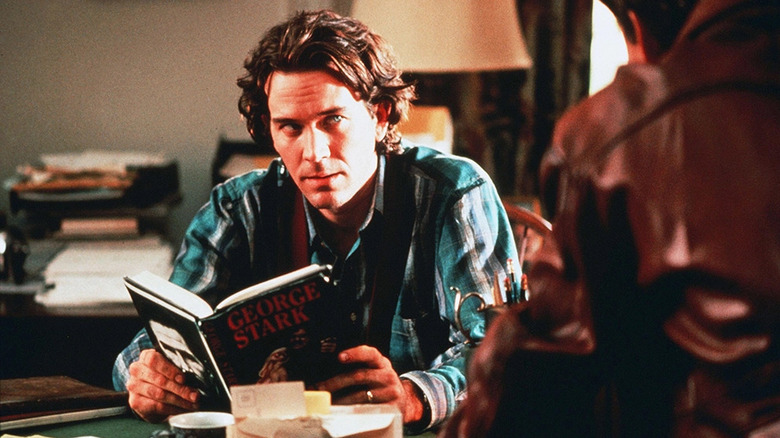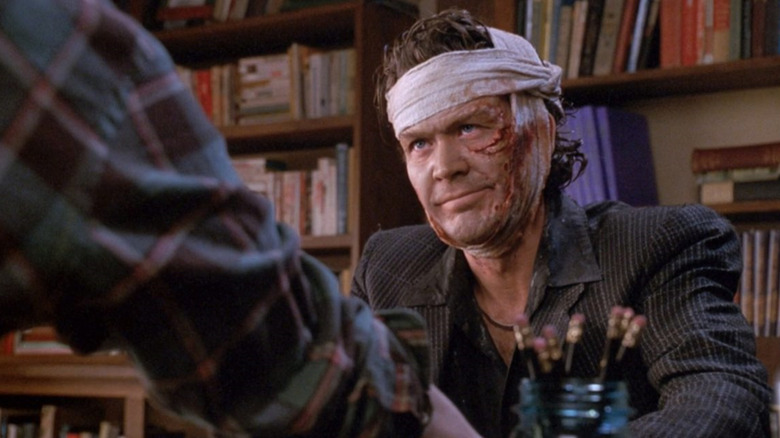The One Review That George Romero Appreciated The Most
George Romero has accrued well-earned praise over his 50-plus-year career. The "Godfather of the Dead" made a splash in 1968 with one of the first midnight movies, "The Night of the Living Dead," introducing audiences to the prototype for what we would recognize as the modern-day zombie: shuffling around, eating people, must be shot in the head, that sort of thing. His filmography is extensive enough to get its own Wikipedia page which includes further "Dead" movies over the decades – "Dawn of," "Day of," Land of," and the maligned "Diary of" — as well as the odd Dario Argento or Stephen King collaboration (as well as one that Could Have Been).
The latter worked with Romero over the years on the classic anthology "Creepshow" (King writes, Romero directs) and in adapting his own 1989 novel "The Dark Half" for the big screen four years later. Among the accolades, the multi-hyphenate received over his career and prior to his death in 2017, Romero's favorite came from a "Dark Half" review by critic Vincent Canby of the New York Times. He tells Filmmaker Magazine:
"As a filmmaker, there have been a couple of people who have written about my stuff that I think give it too much credit. [Vincent] Canby's review of 'The Dark Half' was probably the review I appreciated most because no one liked that movie and Canby was the only guy who saw what I was trying to do with it, and was able to get past Steve King. I mean, I got blamed by all these reviewers, and I got blamed because of Steve! [laughs] It was like, 'Steve, what are you doing to me here?!'"
There are two wolves inside of you. One wears more hair mousse.
"The Dark Half" is what Canby calls, "another nightmare vision by the best-selling author, who is fond of meditating, in his own singular way, on the cost and dimensions of his success." It concerns Thad Beaumont (Timothy Hutton, performing against type), a novelist who tries to retire his pen name, George Stark, which he uses to write bestselling murder mysteries. When Stark emerges in the flesh, he resembles Evil Ernest in "Ernest Goes to Jail" – slicked-back hair and a nasty grin separate Good Thad from Bad Thad. He terrorizes Thad's family until the two finally confront each other for supremacy. It's crisp, grim, and features a bonus Michael Rooker playing a cop!
Side note: King dedicated "The Dark Half" novel to "the late Richard Bachman," his own pseudonym used to write some of his greatest works like "The Regulators."
Canby's review is even-handed and filled with nuanced praise. He describes Romero's films as "so beautifully done that Hitchcock might have admired them, or at least their technical facility." What he appreciates the most is how well it works as one of the few solid King adaptations. Canby writes:
Only Stanley Kubrick has ever adapted a King novel ("The Shining") in such a way that the ending remains as satisfyingly spooky as the beginning. "The Dark Half" is not in the same league with "The Shining," but it out-distances every other King adaptation I've seen. Unlike Mr. Kubrick, Mr. Romero observes the conventions of the horror-film genre, but he observes them with inventive humor, and he holds off on the fancier special effects until virtually the last minute.
Conventional horror with humor and discipline, eh? Canby might as well have been describing any Romero work.

